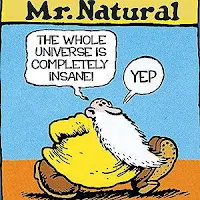 |
| Building the illusion of the consumer capitalist dream |
Underground artist Robert Crumb drew comics that expanded and distorted my malleable mind when I was a kid. I loved his twisted take on our crazy world.
After growing up with Crumb's alternative art, as an adult I discovered his writing and learned more about the man behind the drawings. In his words I found the source of the twisted views which generated so many classic silly images like the Keep On Truckin guy and Mr. Natural.
I found that this artist was a serious philosopher and social critic. I loved his way of thinking even more than his unique way of drawing.
Crumb, was born in 1943, the year that shoe rationing went into effect in the US due to WWII. But such restraint was not to last for long. Soon many parts of the world, including the US, transitioned into the post-World War II economic expansion, or the "Golden Age Of Capitalism".
During the period that lasted from 1945 until the 1970s, many western economies saw consumerism and advertising take over. Cheap mass produced items hit store shelves and shopping was packaged as an activity unto itself.
Lifestyles began to change. Both the complexity and speed of life began to ramp up in a way never seen before. The era of excess was about to dominate the common person's sense of reality as people were transformed from participating citizens to passive consumers purchasing distractions with their new "disposable income".
Of this period Crumb says, "As a kid growing up in the 1950s I became acutely aware of the changes taking place in American culture and I must say I didn't much like it." Indeed, the times were turning toxic.
Chemical fertilizers and pesticides promised "better living with chemistry", and they weren't even the most toxic inventions unleashed upon a dangerously unaware public at the time.
Other inventions like Disneyland, The American Dream, and corporate controlled mainstream media and entertainment were toxic to former free thinking, free living people across the land. It was the beginning of the consumerism illusion.
"What we kids didn't understand was that we were living in a commercial, commodity culture. Everything in our environment had been bought and sold. As middle class Americans, we basically grew up on a movie set.
The conscious values that are pushed are only part of the picture. The medium itself plays a much bigger part than anyone realizes: the creation of illusion. We are living surrounded by illusion, by professionally created fairy tales. We barely have contact with the real world."Crumb does not feel optimistic about how this experiment in social engineering will turn out. He envisions a result where everyone is scamming everyone else, a situation that we seem to have achieved.
"The problem is that the longer this buying and selling goes on, the more hollow and bankrupt the culture becomes. It loses its fertility, like worn out, ravaged farmland.
Eventually, the yokels who bought the hype, the pitch, they want in on the game. When there are no more naive hicks left, you have a culture where everybody is conning each other all the time.
There are no more earnest "squares" left—everybody's "hip," everybody is cynical."
Robert Crumb knew that we left something important back in the 1950s, something authentic, slow, human, and real. It was all replaced with an illusion that keeps us complacent and too busy to think clearly about what is going on.
"It's much easier to lie to humans and trick them than to tell them the truth. They'd much rather be bamboozled than be told the truth, because the way to trick them is to flatter them and tell them what they want to hear, to reinforce their existing illusions. They don't want to know the truth. Truth is a bring-down, a bummer, or it's just too complicated, too much mental work to grasp."I guess all we can do is keep on truckin' for the kind of changes that everyone will benefit from. I am sure Mr. Crumb would approve of a bit of free thinking that leads to restoring sanity to our increasingly crazy world.


All this is extremely well put. The explanation about people not wanting to hear the truth is so simple and clear, it might even be understood by those very people it describes.
ReplyDeleteI'm 100% with you, and very glad to have found this blog. I also love Crumb, and his "A Short Story of America" is a masterpiece.
Hey Christian R.,
DeleteWe are glad you found us here at NBA, and that our message resonates with you. Humanity will need to address the facts, and soon, if we are going to save ourselves from a very painful adjustment back to sustainable living.
Nice to pull in another R. Crumb fan. Thank you for mentioning more of his work - I will be checking the public library for "A Short Story of America".